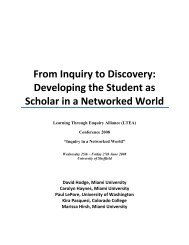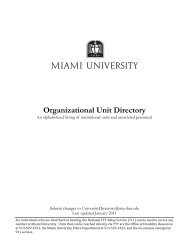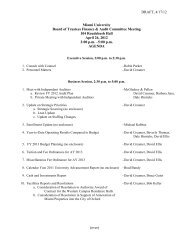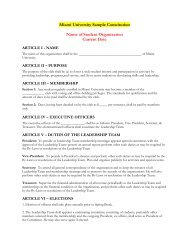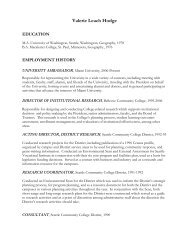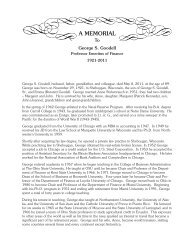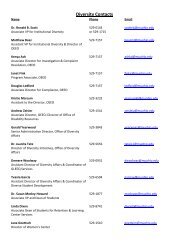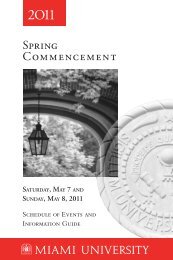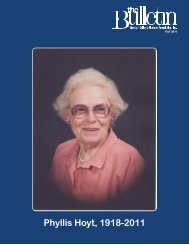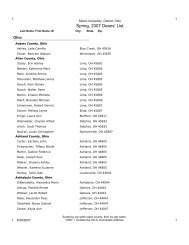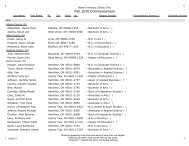A MEMORIAL - Miami University
A MEMORIAL - Miami University
A MEMORIAL - Miami University
You also want an ePaper? Increase the reach of your titles
YUMPU automatically turns print PDFs into web optimized ePapers that Google loves.
A <strong>MEMORIAL</strong><br />
To<br />
David Stanley McLellan<br />
Professor Emeritus of Political Science<br />
1924 – 2010<br />
David Stanley McLellan, Professor Emeritus of Political Science died Sunday, February 21, 2010, at<br />
his home in Yellow Springs, Ohio. He was 85.<br />
Dave McLellan was the son of hardworking Scottish immigrants who learned that with determination<br />
and education he could rise and make a difference in society. He championed civil rights, became a<br />
widely admired and respected teacher who touched the lives of countless students, wrote dozens of<br />
articles and books on post-World War II international relations, and raised four children with Ann,<br />
his beloved wife of 65 years. Dave was born December 24, 1924 in Brooklyn, New York. His father<br />
Charles was a veteran of the Great War and a skilled bricklayer. During the hardest years of the Depression,<br />
unable to find steady work in his trade, Charles sold household supplies door-to-door. Dave’s<br />
mother Jessie took cooking and cleaning jobs, and the family rented out the first floor of its small<br />
house in Harmon on Hudson and moved upstairs.<br />
Though the Depression years were difficult, “Red,” as his wife and old friends called him for his red<br />
hair, often recounted events during this period with a twist of self-deprecating humor. As a teenager,<br />
for example, one of his jobs was delivering newspapers which, Dave later wrote in his essay “Dogs I<br />
Have Known”:<br />
. . . opened two windows in my life. It meant that every afternoon for an hour<br />
and a half, as I read the news stories on the front page, I acquired a knowledge<br />
of what was going on in the world that exceeded that of anyone but the most<br />
educated and attentive person<br />
. . . . [T]he Spanish Civil War, Roosevelt’s Court Packing Plan, the rise of Hitler’s<br />
Germany, the Italian invasion of Ethiopia, the Japanese invasion of China<br />
and Stalin’s great purge trials unfolded before me day after day as I trudged on<br />
my daily rounds. . . . The other window that the paper route opened was into<br />
the lives of other people — better educated, professional people — whom I’d<br />
never have gotten to know had I not met them from time to time when making<br />
my weekly collection.<br />
A track scholarship served as Dave’s ticket to Yale <strong>University</strong> in 1942. While at Yale, Dave continued<br />
to court his high school sweetheart Ann Handforth. Dave and Ann were married in 1945 just before<br />
he left for the Pacific where he served as a navigator and bombardier on a B29 during the war’s final<br />
months. The memories of firebombed Japanese cities haunted him long after the war, and he was<br />
thankful to have been spared the horror of ground combat. After Japan’s surrender, his crew flew<br />
supplies to starving prisoners in northern Korea. He charted the flight and found that they could fly<br />
over Shanghai on the way north and over Hiroshima on the return. As they flew over Shanghai, he<br />
recalled years later, the sky was filled with kites celebrating the war’s end. When they reached their<br />
destination, one of the big canisters of supplies would not dislodge from the bomb bay. A bit like the
scene in “Dr. Strangelove,” Dave had to climb out over the open bomb bay holding on to the straps<br />
and kick the canister loose. The return flight was far more somber, as the plane passed over the destruction<br />
wrought by an atomic bomb.<br />
Returning to Yale, Dave finished a Bachelor’s Degree in 1948. Then he and Ann left for Europe<br />
where Dave earned a License en Sciences Politiques from the <strong>University</strong> of Geneva, and they both enjoyed<br />
bicycling around the continent. Following a Master’s Degree in international relations from Yale,<br />
Dave, Ann and new daughter Hilary departed for Grenoble, France, where he conducted research for<br />
his PhD dissertation, and where Michele was born. At the same time, as a contract employee for the<br />
Central Intelligence Agency, Dave scouted the Alps and measured fields where Allied airplanes might<br />
land if the Soviet Union invaded Europe. (The McLellan family photo collection from that time is replete<br />
with images of Alpine meadows.) Later, when the CIA invited Dave to join its efforts in Vietnam,<br />
his wife Ann, now mother to three young daughters--Marjorie had joined Hilary and Michele--put her<br />
foot down at the idea of a separation.<br />
In 1955 the family moved to Riverside, California, where Dave was a founding member of the Political<br />
Science Department at the <strong>University</strong> of California, and where son Eric was born. In California,<br />
Dave became deeply involved in Democratic politics and the civil rights movement. Dave’s parents<br />
had left Scotland in part to escape rigid class differences, and as a child, he had felt the sting of being<br />
at the low end of the social pecking order because his parents were immigrants, and later he sensed<br />
the scorn of his more privileged classmates at Yale. An incident he never forgot was a visiting African-<br />
American college friend of his younger brother Robert being turned away from a public swimming<br />
pool. Dave would target his passion for justice and equality on the rights due African-Americans. In<br />
addition to public statements, he frequently and emphatically admonished his children about the<br />
wrongs of racial prejudice, deliberately sought to befriend and support colleagues of color, and along<br />
with Ann opened their home to leaders of the movement who visited California to tell their story,<br />
recruit backers, and raise funds.<br />
Dave was not afraid to take unpopular positions, even when they might put him at risk. As a young,<br />
untenured professor in the 1950s, he spoke out forcefully and publicly against the repressive tactics<br />
of the House Un-American Activities Committee. He also predicted the Soviet Union would be too<br />
busy with a rivalrous China to menace the United States, controversial words in the 50s and 60s.<br />
Dave was active in voicing his opinion that the U.S. involvement in the war in Vietnam was tragically<br />
mistaken. In 1969, teenage daughter Michele was only mildly surprised to run into her father at an<br />
anti-war rally in Riverside.<br />
Dave and Ann instilled a love of travel in their children and opened their eyes to the world beyond the<br />
United States. In 1966, he accepted a two-year post as director of the <strong>University</strong> of California’s program<br />
in Bordeaux, France. They enrolled their children in French public schools, determined that they<br />
learn another language and understand another society. The family--in a VW bus and camping along<br />
the way--toured much of Western Europe.<br />
In 1971 Dave joined the Political Science Department at <strong>Miami</strong>. As at UC Riverside, he was a devoted<br />
and popular teacher. <strong>Miami</strong> colleague, Steve DeLue, recalled:<br />
I remember so vividly what a beloved teacher he was to his students. He was one of the finest scholars<br />
the department ever had, but this did not take any time from his attention to students, which was limitless.<br />
He would sit in his office writing comments on mountains of papers from his exceptionally large<br />
classes. He had large classes because the students loved him so much.<br />
Dave was particularly generous in the time and effort he dedicated to the many graduate students he<br />
mentored. A significant number of these students went on to establish distinguished academic careers.<br />
Thus, Dave’s voice still may be heard in university classrooms, not only in the U.S., but also in<br />
at least a half dozen countries around the world.
In a long and productive scholarly career Dave published numerous books and articles in the field of<br />
international affairs and foreign policy. The Cold War in Transition became required reading at many<br />
universities in the 1960s and 1970s. The Theory and Practice of International Relations, which he coedited<br />
with Fred Sondermann and William Olson, went through six editions and was widely adopted in<br />
international relations classes. Dave’s path-breaking work on the operational code of political leaders<br />
resulted in two critically appraised biographies, Dean Acheson: The State Department Years, and<br />
Cyrus Vance. He also edited a volume of Acheson’s personal letters, entitled Among Friends. The<br />
Acheson biography won the Truman Library David Lloyd Prize for the best book on the Truman era<br />
during 1975-77, and in a New York Times book review, the eminent American diplomatic historian,<br />
Gaddis Smith, wrote: “this is a good book; careful, thoroughly researched, the product of more than<br />
a decade’s work. Acheson’s voluminous published work and his rich unpublished papers have been<br />
used to excellent advantage. Acheson would be pleased with the portrait.”<br />
Dave’s stature as a scholar in the field of international relations was widely recognized. He was<br />
awarded a Ford International Relations Post-doctoral Fellowship in 1959, a fellowship at the John<br />
Hopkins <strong>University</strong> Center for Foreign Policy Research in 1963, a Rockefeller Fellowship at the Villa<br />
Serbelloni, Italy, in 1970, a Clare Hall Fellowship in Cambridge, England in 1982, and a Woodrow<br />
Wilson Fellowship in Washington, D.C. in 1983. He served as president of the Midwest section of<br />
the International Studies Association from 1978-1980 and was an associate editor of the journal Diplomatic<br />
History for many years.<br />
In addition to his teaching and research, Dave carried his full share of administrative responsibilities<br />
at <strong>Miami</strong>. He chaired the Finch Lecture Committee, which brought a series of prominent diplomats<br />
to campus as guest lecturers. He also chaired the Rhodes Scholarship Selection Committee and the<br />
committee charged with selecting manuscripts for publication under the joint imprimatur of the <strong>Miami</strong>-<br />
Ohio State <strong>University</strong> Press. In 1982-1983 Dave served as interim chair of the Department of Political<br />
Science.<br />
Notwithstanding the long hours devoted to professional responsibilities, Dave found time to voice support<br />
for human rights and argue for a more enlightened American foreign policy grounded in lessons<br />
that should have been learned from past errors. Dave and Ann, along with a small group of colleagues<br />
and friends, were founding members of an Oxford chapter of Amnesty International in 1979.<br />
Dave sent off a steady stream of cogent, eloquent appeals urging foreign governments to respect international<br />
human rights norms in cases reporting grave violations, or advocating reforms and greater<br />
human rights compliance in U.S. policy. Dave took the responsibilities of citizenship in a democratic<br />
society very seriously and was an inspiration to those who knew him. Sumit Ganguly, a former student<br />
who has achieved prominence as a scholar and is himself a major contributor to foreign policy<br />
debates, reflected that Dave served not only as a “superb mentor but a moral exemplar.”<br />
In 1986 Dave retired from his full-time position at <strong>Miami</strong>, but continued teaching until 1990. In<br />
retirement, Dave enjoyed admiring Impressionist landscape paintings, listening to opera and Scottish<br />
folk music, reading Wordsworth and the British Romantic poets, and writing about his experiences.<br />
He found a haven of peace and beauty at the cabin he built with his family on the north coast<br />
of Prince Edward Island, Canada, and took great pleasure in spending time with his family, which<br />
grew to include three grandchildren. Despite failing hearing and eyesight and the cruel onslaught<br />
of Alzheimer’s, Dave remained remarkably connected to the world around him. He learned to use a<br />
hand-held scanner to read articles one word at a time on a large television screen. Until about a week<br />
before his death, he read several pieces from The New York Times each day and was always ready<br />
to discuss or explain a thorny national or international issue, whether it was religious conflict or the<br />
economic meltdown.
Dave is survived by his wife, Ann Handforth McLellan of Yellow Springs; son Eric, daughter Marjorie<br />
and son-in-law Gary Greenberg, all of Yellow Springs; daughter Michele McLellan of Phum Thum,<br />
Cambodia; son-in-law Roger Wyatt of Saratoga Springs, New York; grandson Jesse Greenberg of Los<br />
Angeles, and granddaughters Cara Greenberg of Columbus and Hypatia McLellan of Yellow Springs.<br />
His oldest daughter Hilary preceded him in death in October 2009.<br />
Memorials may be sent to the David S. McLellan Scholarship at <strong>Miami</strong> <strong>University</strong>, 920 Chestnut<br />
Lane, Oxford, OH 45056.<br />
Respectfully submitted by Steve DeLue, Will Hazleton, William Jackson, Frank Jordan and<br />
Michele and Marjorie McLellan.



